Dangers in Russia
Russia does not enjoy good media coverage in the West and if you believe some of the more negative coverage, Russia is a corrupt, mafia-controlled state, populated by crazy-driving racists and homophobes, where you are likely freeze in the cold, get infected with AIDS, be eaten by a bear or be blown up in a terrorist attack. Of course this is nonsense! Some criticisms of Russia are more or less fair but anti-Russian politics and prejudices or just plain misconceptions play their role in distorting the reporting. Therefore we have included this section on dangers in Russia, not because Russia is an especially risky place for tourists but to simply try to separate the fact from the fiction and to give you good advice on making your visit to Russia pass without any problems.
CRIME
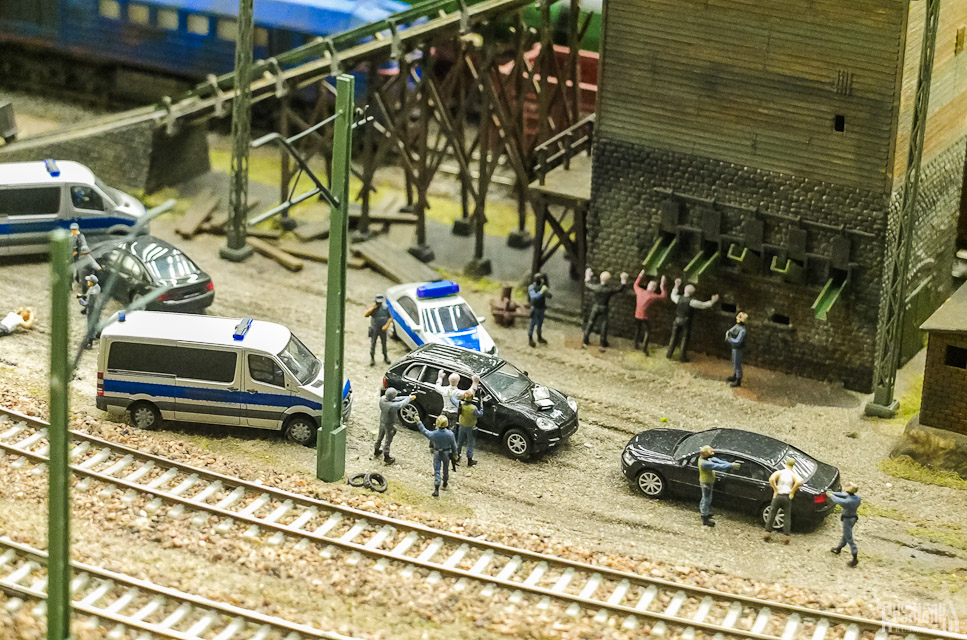
Russia is often depicted in the West as a dangerous country completely controlled by the mafia. This depiction is somewhat distorted. Although you may see some shady looking guys driving around in luxury cars with blacked-out windows and thuggish-looking security guards, these attributes are no longer just found among the mafia. In any case the ordinary tourist is very, very unlikely to get mixed up with any mafia, unless he goes looking for it of course.
In addition, tourists are also unlikely to experience street crime in Russia. Like in every major city pickpockets do operate at busy tourist areas and are likely to target tourists in the belief that they will have more money on them. However if you keep your wallet in a safe place and don't draw more attention to yourself than necessary, you should be fine. Moscow and St Petersburg are still much safer cities than, for example, New York, Paris or London, but of course common sense is still required. If you stumble out of a bar late at night completely drunk or walk around with your wallet hanging out your back pocket you might be asking for trouble.
Some odd tricks have also been developed by conmen and sometimes these are used to target tourists. One such trick is for a man to drop a wad of cash in front of you. If you then pick it up, he will then claim you have stolen half of it and with his friends will demand you give back the full amount. Again simple common sense will protect you from this type of trick - don't pick up wads of cash lying around!
WILD ANIMALS

The myth of the ubiquitous Russian bear is probably one of the most enduring myths about Russia, but while Russia does have large bear populations in remote parts of the country, the chances are that during your trip you will only see one at a zoo. In places where there is a risk of wild bears, there are usually signs warning you of such and giving advice. In reality you are probably more at risk of being attacked by a stray dog than a bear, although this too is unlikely! Even in Moscow and St Petersburg you can see stray dogs and sometimes even packs of them, although the situation now is nowhere near as widespread as it was a decade ago. Most of the time these dogs are used to people and won't bother you unless you start provoking them. However there is always a risk that something might set them off, so you should not approach them. Standard advice for a dog attack (and for that matter a bear attack) is not to run away, normally the dogs will back down after a lot of barking. If you are unfortunate enough to be bitten by a stray dog, you should seek medical advice and might even need a rabies jab.
HEALTH

No vaccinations are mandatory for travelling to Russia, but you might want to make sure your routine vaccines are up-to-date. You should of course have good medical insurance as if you have to go to a Western-style English-speaking clinic in Russia you will face a hefty bill. The prevalence rate of HIV and AIDS in Russia is higher than in Western Europe and of course the standard safe-sex advice applies to Russia. If you plan to sleep with prostitutes or use intravenous drugs while in Russia, then good luck to you! You might come back with a long-lasting souvenir.
Mosquitos are common in summer in Russia, both in cities and the countryside. Ticks and horseflies are also not unusual in natural surroundings and if you intend to go camping in remote parts of Russia it is worth contacting your doctor about getting a vaccination against Tick-borne Encephalitis – which should be done around 6 weeks in advance. Otherwise these bugs are just an annoyance. You can buy all sorts of effective pest control in many supermarkets and chemists in Russia.
LOST PASSPORT
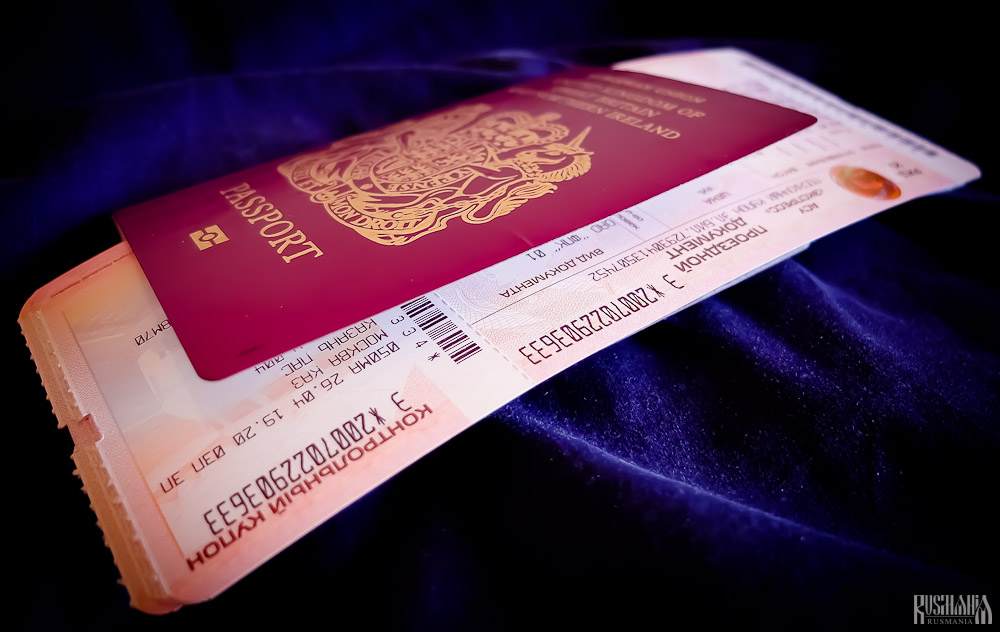
Out of all the terrible things that might happen to you in Russia the most likely one is that you will lose your passport. This is unfortunate not because you will be trapped in Russia forever but because you will lose a large chunk of your holiday sorting out a replacement. Should you lose your passport call your embassy or have a look on their website for advice. Most likely you will need to visit a Russian police station in the area where you believe you lost your passport or had it stolen, so that they can issue you with a document (“spravka”). Then you will need to contact your embassy to get a replacement or an emergency passport to leave the country. This whole process is made easier if you have photocopies of your passport photo and your visa and immigration card. You will probably not be able to check into hotels or get on a Russian train without your passport.
When you cross the border into Russia you will be issued with a slip of paper in two parts which you will need to fill in (although at Moscow's airports this is printed out automatically for you). One half will be taken immediately and you should hand back the other half when leaving Russia. Losing your immigration card will also mean that you will have to visit a police station to register it as lost.
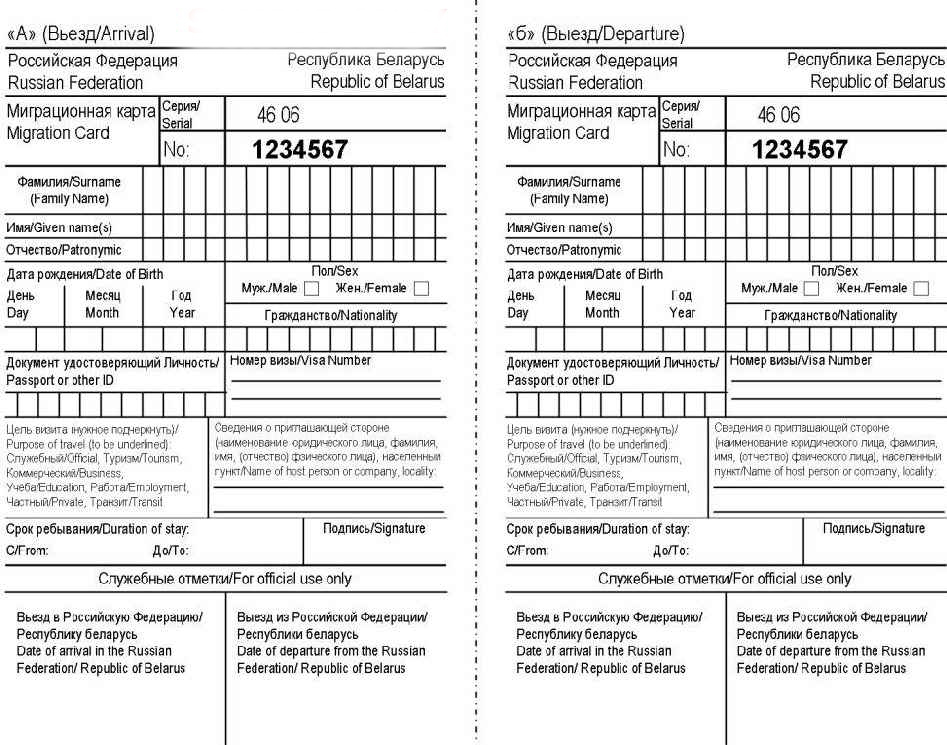
You will have lots of problems at the border if you do not do this and don’t have an immigration card. You will also probably not be allowed to check into a hotel without your immigration card. In short - keep very good care of your passport and immigration card. It is definitely worth attaching the immigration card to your passport with a paper clip.
DRIVING
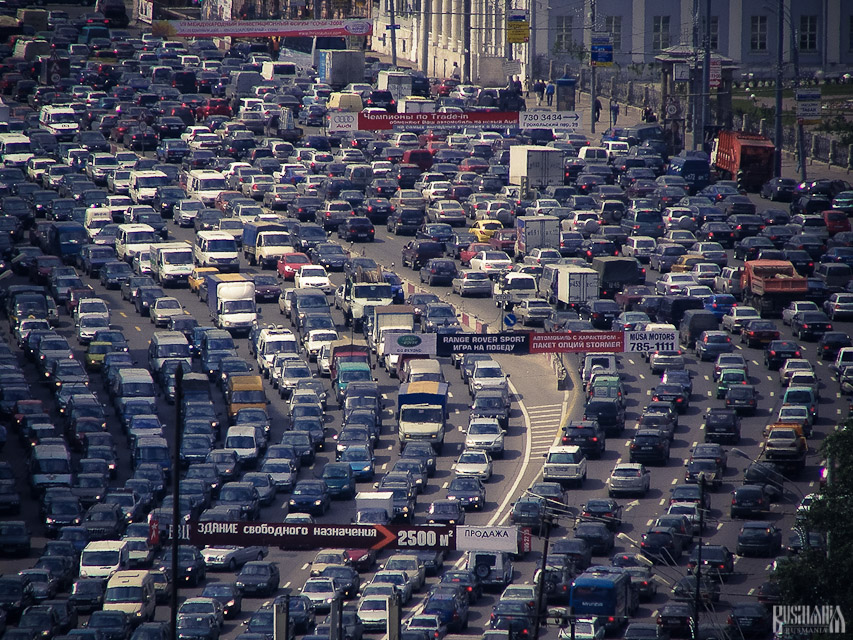
Type "Russian Driving" on YouTube and you will find hundreds of videos of Russian driving which are hilarious and terrifying at the same time. So as there is video evidence that Russian has its fair share of maniacs behind the wheel, there is little point arguing the opposite. However this problem is not unique to Russia, it is just more known about in Russia thanks to the dash-cams often fitted in Russian cars protect drivers from insurance scams and to make insurance claims easier.
TERRORISM

There have been several terrorist attacks in Russia which have made international headlines. High-profile cases include suicide bombers in Moscow, including on the metro in 2001, 2003 and 2004, bombings of apartment blocks in Moscow and Volgodonsk in 1999, hijacking and bombing of planes in 2004, and a siege of a Moscow theatre in 2002 and of a school in Beslan in 2004, both of which ended in bloodbaths. Most recently in December 2013 there were bombings in Volgograd.
The vast majority of terrorist attacks were carried out by Islamic fundamentalists from Russia's Caucasian republics. In recent years the occurrence of terrorist attacks, especially in Moscow, has decreased, although there is still a high risk in the Caucasus, even in popular tourist destinations such as the Mineral Water resorts, where tourists have been targeted in the past. Sadly this problem is not confined to Russia and you are probably at no more risk of being involved in a terrorist attack in Moscow or St Petersburg than you are in New York, London, Paris or Madrid. However the risk increases significantly in the troubled North Caucasian republics (especially Chechnya, Dagestan and Ingushetia) and parts of the Stavropol Territory - which are not considered safe for tourists. You should check your foreign ministry’s travel advice before planning your trip to Russia.
RACISM
Russia is frequently portrayed in the West as a racist country. There is sadly no denying that there is to a certain extent a problem with skinheads and neo-Nazis, but these extremist groups do not represent the views of the vast majority of Russians. These groups are most noticeable at football matches and in deprived parts of the country and tourists will most likely not come across them on their travels in major tourist destinations. If you are unfortunate to find yourself near a group of skinheads, just get away from them as soon as you can and don't draw attention to the fact you are foreign.
If just talking about usual Russians, without including extremists which exist in many countries, then in conversation you might occasionally hear a phrase which would be classed as non-politically correct or even racist in the West, but this is rarely accompanied by any hatred or aggression. Political correctness doesn't really exist in Russia. Much of the more everyday racism in Russia is directed towards Caucasians and immigrant workers from Central Asian countries. On occasions conflicts have flared up between ethnic Russians and Caucasians and Central Asians, often made worse by an inefficient justice system. Asian tourists may be mistaken for Caucasians or Central Asians and may find themselves being stopped by the police (supposedly with the view to prevent terrorism and fight illegal immigration). Provided your documents are in place this should not become anything more than an annoyance.
The Russian word 'negr' (pronounced nee-gr) is often used to describe a black person but does not have the racist connotations it has in English, although nevertheless some Russians refrain from using it, understanding the confusion and offence it may cause. Black visitors to Russia will probably experience people staring at them, but more violent examples of racism are rarer.
HOMOPHOBIA
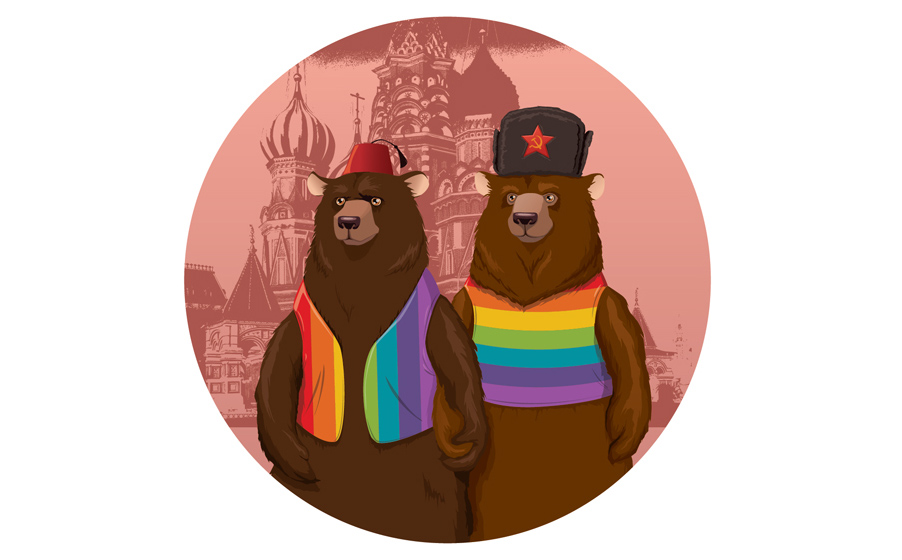
It seems today the main criticism the West has against Russia is that it is a country where homosexuality is not tolerated and gays are at a real threat in Russia. This topic became popular during the run up to the Sochi Olympics and after a law was issued banning homosexual 'propaganda' for minors. There is no denying that Russia is a country with traditional values and open displays of homosexual activity (including even holding hands and kissing) is often not welcomed in public. However the portrayal of Russia as unbelievably homophobic country is unfair, and is encouraged for political reasons to discredit Russia. After all in some Arab, African and Caribbean states homosexuals have a harder time (including the risk of imprisonment), yet there is no Western campaign is targeted against them so aggressively.
Homosexuality of course exists in Russia, just not as openly as in the West and the majority of Russians for now, including many Russian homosexuals, are fine with keeping it that way. Homosexuality was only decriminalised in 1991 and it of course takes time to change people's views. There are many gay clubs in major cities and many gay dating websites for Russians. Rumours that two men or two women will be refused to stay at a hotel are complete nonsense, although the staff might be worried that you won’t be happy sharing a bed. The truth of the matter is that homosexuals visiting Russia are unlikely to experience any problems. However if you come to Russia intent on displaying your sexuality in public, to protest about homophobia or to promote a gay lifestyle to children, you are probably asking for trouble.
CORRUPTION
There is no denying that corruption remains a problem in Russia. Of course corruption exists in most countries, even in the European Union and the USA. But the difference with Russian corruption is that it can still be seen on an everyday level and it is not carried out in such a refined manner as it is in the West. Tourists though are unlikely though to experience this on a visit to Russia. Russian police, especially the traffic police, still have a reputation for being corrupt, but are now less likely to stop tourists than was the case in the 1990s and early 2000s. If you are unfortunate enough to be stopped, which as we mentioned is now not common, you should show your passport, migration card and registration (registration is needed if you have been in the country more than seven working days). If problems continue you can threaten to ring your embassy. Under no circumstances should you attempt to pay a bribe to a police officer or a border guard. Also do not keep money in your passport as this could be misconstrued as an attempted bribe.
WEATHER

Another great misconception about Russia is that it is the land of eternal winter. This is of course untrue and as a country with a predominantly continental climate much of it sees an extreme range of temperatures. For example Moscow frequently sees temperatures of under -25 degrees Celsius in winter and over 30 degrees Celsius in summer. It is only the Far North of Russia which never gets particularly hot, whereas the Black Sea coast where Sochi is located enjoys a subtropical climate when temperatures remain mild in winter.
Winter is actually a great time to visit Russia as the country transforms into a picturesque and cosy winter wonderland. In fact sometimes it can even be worse visiting Russia in the peak of summer when you may find it hard to cool down in a country where buildings are built to keep in the warmth and don't always have air condition. You will certainly tire very easily when walking around stuffy Moscow in 30 degree heat. The Russians say there is no such thing as bad weather, just bad clothes and there is a lot of truth in this saying. If you wrap up warm in winter with lots of thin layers and have good boots, gloves and a hat, you should be fine, especially as almost all buildings are very well heated and most parts of the country have low humidity. It is after all the humidity which makes the cold really unpleasant. This can be experienced in St Petersburg on the banks of the Neva from where a freezing wind blows in, chilling you to your bones!
METEORITS
On 15 February 2013 the industrial city of Chelyabinsk in Russia's Urals district made international headlines when a meteor fell to earth and exploded over the city. Meteorites fall to earth rather frequently but extremely rarely over a city with a population of over a million, where lots of cars are fitted with dash-cams allowing some spectacular scenes to be caught on camera. Although nobody died many people were injured, mainly suffering cuts as windows smashed in the shock wave that followed. This was not the first time a large meteor exploded over Russia, back in 1908 there was a huge explosion over the Podkamennaya Tunguska River in Siberia which flatted over 2000 square kilometres of forest. Again, nobody was killed as it fell in an uninhabited area. So be warned, in Russia, thanks to its massive landmass, your chances of being hit by a meteor are just that tiny bit less miniscule!